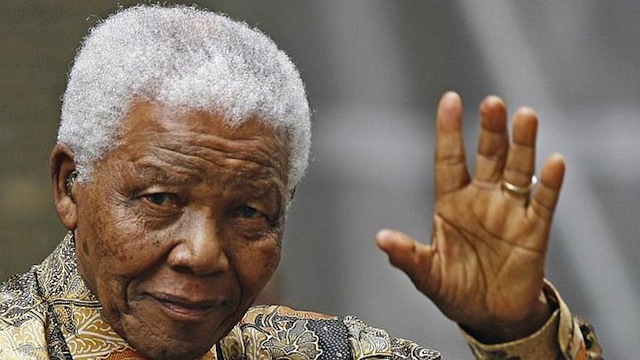How do you move from mourning to memory?? How do you begin to make the shift from acknowledging and honoring the pain of a loss, to building and celebrating the memory of the one who is gone?? These are the questions which all of us who care about Nelson Mandela will need to begin asking and answering in the weeks and months ahead.
How we mourn is fundamentally something which comes right from the heart.? Whatever rituals and practices shape our mourning, from ancient to just invented, all work best when they help us open our hearts, feel the loss more deeply, and ideally, the love of those who will support us through it.? That’s mourning.? Memory is different.
Memory must honor what we feel in our hearts, but it must also be shaped by what’s in our heads.? For memory to be powerful and durable, it must come from both the heart and the head.? Yes, that’s a false dichotomy, but it’s a useful one, so go with it.
Memory is a choice – whether it’s about Nelson Mandela, a departed family member, a past relationship or pretty much anything else.? We choose what to remember and what not to remember.??? Will we remember with anger?? With idealized rose-colored glasses?? As a way to heal?? It’s up to us.
How will we remember Nelson Mandela?? As a firebrand revolutionary?? As the long-suffering prisoner of Robben Island?? Will we remember him as a peace-seeking political activist?? As a national healer committed to the marriage of “truth and reconciliation”?
To be sure, Nelson Mandela was all of these things and so much more, and I will remember them all.? I also want to suggest one more way to remember him – one which I think will help assure his legacy for the ages, and one which we can all use to better our own lives right now.
I want to remember Nelson Mandela as the man who moved with such grace and integrity through being all of those people mentioned above, integrating the wisdom of each experience as he did so.? In our world of either/or, Nelson Mandela mobilized millions as he championed an approach that was fundamentally both/and.
How many of us would so much happier and healthier if we too could move toward a both/and approach to our own lives – holding on with integrity to our pasts, even as we lovingly and fearlessly embraced the present and the future?? The Nelson Mandela, or at least an important part of the Nelson Mandela who I want to take with us from mourning to memory, and into our everyday lives.
Watch Brad discuss this on Odyssey Network’s Faith on the Record series.

Listed for many years in Newsweek as one of America’s “50 Most Influential Rabbis” and recognized as one of our nation’s leading “Preachers and Teachers,” by Beliefnet.com, Rabbi Brad Hirschfield serves as the President of Clal–The National Jewish Center for Learning and Leadership, a training institute, think tank, and resource center nurturing religious and intellectual pluralism within the Jewish community, and the wider world, preparing people to meet the biggest challenges we face in our increasingly polarized world.
An ordained Orthodox rabbi who studied for his PhD and taught at The Jewish Theological Seminary, he has also taught the University of Pennsylvania, where he directs an ongoing seminar, and American Jewish University. Rabbi Brad regularly teaches and consults for the US Army and United States Department of Defense, religious organizations — Jewish and Christian — including United Seminary (Methodist), Yeshivat Chovevei Torah (Modern Orthodox) Luther Seminary (Lutheran), and The Jewish Theological Seminary (Conservative) — civic organizations including No Labels, Odyssey Impact, and The Aspen Institute, numerous Jewish Federations, and a variety of communal and family foundations.
Hirschfield is the author and editor of numerous books, including You Don’t Have To Be Wrong For Me To Be Right: Finding Faith Without Fanaticism, writes a column for Religion News Service, and appears regularly on TV and radio in outlets ranging from The Washington Post to Fox News Channel. He is also the founder of the Stand and See Fellowship, which brings hundreds of Christian religious leaders to Israel, preparing them to address the increasing polarization around Middle East issues — and really all currently polarizing issues at home and abroad — with six words, “It’s more complicated than we know.”


Comments are closed.